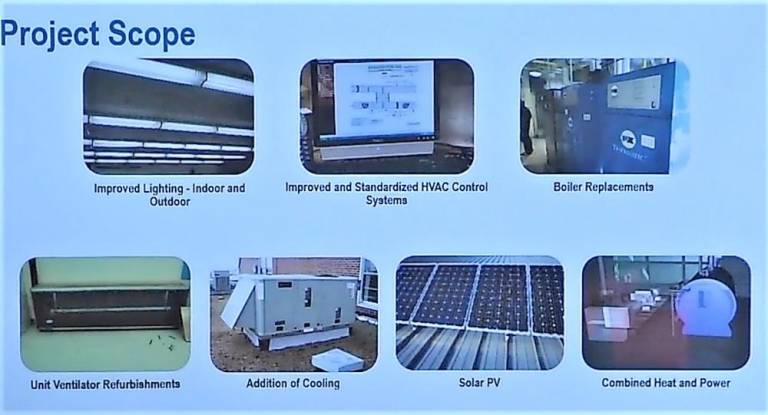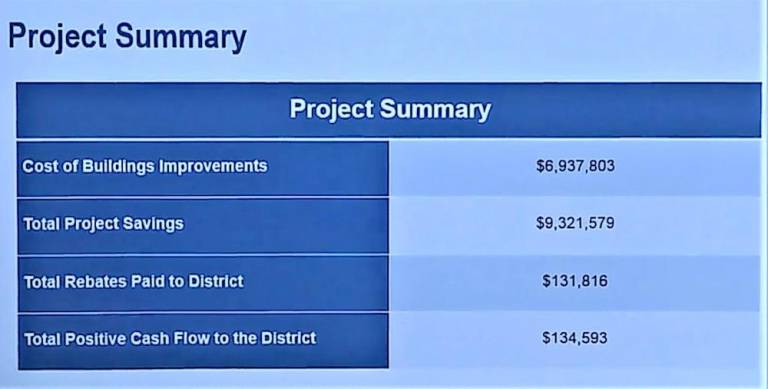School district seeking DOE approval of solar projects
West Milford. The school district is sending it’s 15-year energy plan to the state for approval. The long-range projects include fitting seven district schools with solar panels to produce green energy that would pay for the improvements and possibly bring in money to the district over the term of the plan.


The West Milford Board of Education voted unanimously Jan. 7 to authorize Energy NJ LLC, to submit plans for energy and solar projects in seven of its schools to the state that could not only save money, but possibly make the district an estimated $134,000.
Identified in an Energy Savings Improvement Program and Solar Power Purchase Agreement, approved by the board last July, the district is now sending the plans to the New Jersey Department of Education for approval.
The plans require state Department of Education approval and authorization for amendments to the District's Long-Range Facilities Plan to incorporate the solar projects, officials said.
The projects would install solar panels at seven of the district's buildings, West Milford High School, the West Milford Bus Garage, Macopin Middle School (Senior Lot), Upper Greenwood Lake School, Apshawa Elementary School, Maple Road Elementary School, and Paradise Knoll Elementary School.
According to district officials, the projects also include other Energy Saving Measures through improvements for all of the district's buildings to the tune of nearly $7 million dollars, with no capital outlay required by the school district.
Costs would be covered by guaranteed energy savings received through the agreement.
Such improvements include, installation of indoor and outdoor LED lighting, improved and standardized HVAC control systems, boiler replacements, unit ventilator refurbishments, addition of cooling, Solar PV, and combined heat and power units.
Presentation and approval
The board appointed Energy Systems Group, LLC in early 2019 as its Energy Services Company, to assist the district with implementing an Energy Savings Plan.
The company performed a district-wide "energy audit" and submitted its report to the board on July 23, 2019.
Based on the energy audit report, as well as through information from meetings with a board committee, the board received bid proposals from five energy companies last June.
A Solar Power Purchase Agreement and Energy Savings Improvement Program update was presented to the school board and the community by representatives from ESG at the July 23, 2019 BOE meeting.
During that presentation, board members asked questions, and additional information was provided by the ESG Representatives.
According to the energy audit conducted by ESG, the district currently pays between $0.09258-$.12082/kWh for electricity depending on the school/building.
The company recommended a Power Purchase Agreement with EZNERGY NJ LLC, of Toms River, based on the company's bid proposal to sell electricity to the district at $0.4470/kWh.
That would drop costs between 52-63%, according to the audit.
Energy NJ bid to provide, engineer, procure, install, finance, and maintain (with upgrades as needed) a Solar Array System for the agreed cost of electricity in the seven district buildings, and guarantee the cost of electricity produced.
The program would last 15 years and could earn the district an estimated $134,000 income, according to the plan.
It estimates the district would use an estimated $9.3 million in energy cost savings to finance almost $7 million in building improvements.
According to the report, only seven buildings can meet the requirements for solar panels.
According to the July ESG presentation, three of the buildings included in the PPA for Solar Projects will require $600,000 in roof restoration (not replacement) prior to the installation of the roof-mounted solar panels.
Macopin Middle School, Marshall Hill Elementary School and Westbrook Elementary School buildings do not meet structural reinforcement requirements needed for roof-mounted panels.
However, according to district officials and ESG, solar panels for Macopin would be installed in a car-port system at the High School's "Senior Lot" across the street as a viable alternative setup to service the middle school.
Board members said that this setup would be similar to the solar array currently in place at the Wayne Hills High School parking lot.
The district is expected to spend the $600,000 from Capital Reserve Funds for the restoration of the roofs at Apshawa, Paradise Knoll and Upper Greenwood Lake Elementary Schools in preparation for the solar projects.
The roof restoration comes with a 15-year warranty, covering the life of the PPA/Solar contract, officials said.
Board Secretary/Business Administrator Barbara Francisco said the Energy Savings Program also has an educational component where they involve students (i.e. Green Team and other clubs/classes) providing information about the upgrades and their environmental benefits, with the intent of increasing environmental awareness and providing experience and knowledge to the students.